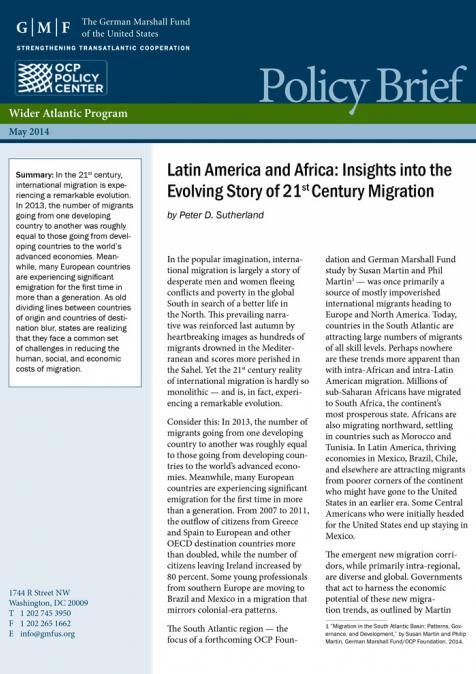In this interview, with Mr.Carlos Alexandre Monteiro Reis, Head of the Rabat Programme Office, UNOCT, Morocco, we discuss the current efforts being undertaken to counteract the radicalization of extremist movements, as well as the need for enhanced cooperation to support impoverished and less educated regions. We explore the connection between extremism and socioeconomic conditions, examining how collaboration can effectively address and mitigate these phenomena.
RELATED CONTENT
-
June 12, 2014Interview with Rabi Mohtar - International Conference on The Water-Food-Energy Nexus in Drylands: Bridging Science and Policy 11-13 June 2014, Rabat, Morocco ...
-
June 12, 2014Interview with Rachid Doukkali - International Conference on The Water-Food-Energy Nexus in Drylands: Bridging Science and Policy 11-13 June 2014, Rabat, Morocco ...
-
May 30, 2014Investing in Youth Leadership: A Roadmap for Action ...
-
May 26, 2014GMF - OCP Policy Center Joint Seminar Serier The Fractured Ocean: Current Challenges to Maritime Policy in the Wider Atlantic ...
-
May 12, 2014Conference on Mega-Regional Trading Arrangements, the WTO, and Responses of Excluded Countries ...
-
AuthorsMay 2, 2014The financial and economic crisis that unfolded across the globe after the 2008 sub-prime meltdown was not just another cyclical bump in the conquering advance of modern capitalism. It was — and still is — a symptom of the exhausted 20th-century way of envisioning the best path to economic growth, consumer satisfaction, and efficient production of goods. Environmental limits to our race to prosperity are just part of the story. The other, and crucial, part is the ongoing technologic ...
-
AuthorsAicha BelarbiMay 2, 2014It is important to understand how today’s migrations are shaping the architecture of Africa and South America, creating intensive South-South and South-North movement, but a weak flow between the two continents. Political, socioeconomic, and environmental differences between Africa and South America could lead to imbalanced migratory processes between the two continents. Migration policy is not a purely rational enterprise; it is usually designed to please public opinion, and remain ...
-
AuthorsPeter D. SutherlandMay 1, 2014In the 21st century, international migration is experiencing a remarkable evolution. In 2013, the number of migrants going from one developing country to another was roughly equal to those going from developing countries to the world’s advanced economies. Meanwhile, many European countries are experiencing significant emigration for the first time in more than a generation. As old dividing lines between countries of origin and countries of destination blur, states are realizing that ...
-
AuthorsPhilip MartinSusan MartinMay 1, 2014This report examines migration patterns in and between the two continents of the South Atlantic Basin — Africa and South America. It assesses migration governance and the migration provisions of regional economic integration agreements and explores the potential of migration and diasporas to accelerate economic development in the South Atlantic. ...
-
April 29, 2014OCP Policy Center Seminar Series Optimal Commodity Taxation and Consumer Welfare ...






